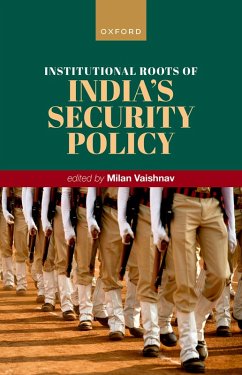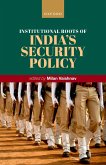In recent years, India has asserted its desire not simply to be a balancing power but to become a leading power on the world stage. As India's economic development has steadily progressed, so too have its foreign policy and security ambitions. However, India's ability to sustain high rates of economic growth at home and project power overseas rests on unsteady state capacities. Despite widespread concerns over the severe institutional constraints that India faces, there is a lack of scholarly research on the administrative and organizational effectiveness of India's security institutions. Myriad inadequacies related to both procedure and personnel continue to hamper the Indian state's ability to perform one of its most essential functions: protecting Indians from security threats at home and abroad. Institutional Roots of India's Security Policy aims to deconstruct and interrogate disparities in India's security institutions through high-quality analytic examinations of more than a dozen foreign policy and national security institutions spread across four domains: the armed services, intelligence, border and internal security, and police and investigative agencies. A one-stop resource on India's security institutions, this volume demystifies secretive institutions that have long eluded careful scrutiny, including India's paramilitary forces, the Intelligence Bureau (IB), the Research and Analysis Wing (R&AW), and the Central Bureau of Investigation (CBI).
Dieser Download kann aus rechtlichen Gründen nur mit Rechnungsadresse in A, B, BG, CY, CZ, D, DK, EW, E, FIN, F, GR, HR, H, IRL, I, LT, L, LR, M, NL, PL, P, R, S, SLO, SK ausgeliefert werden.









